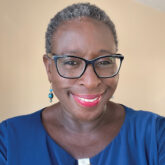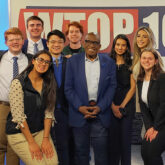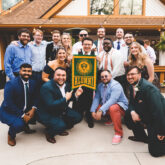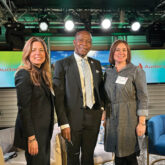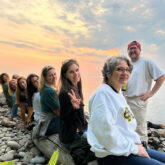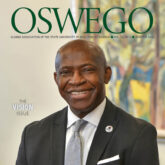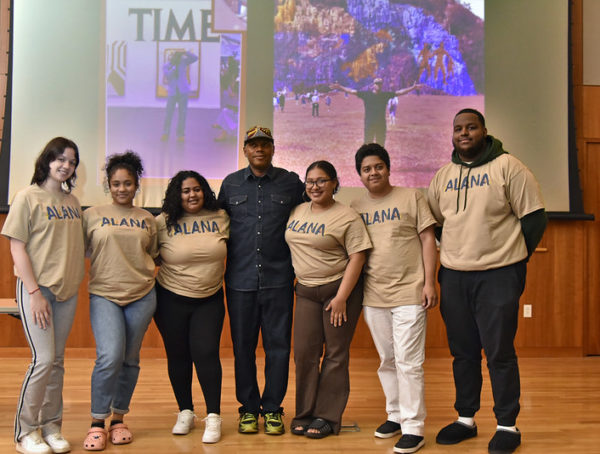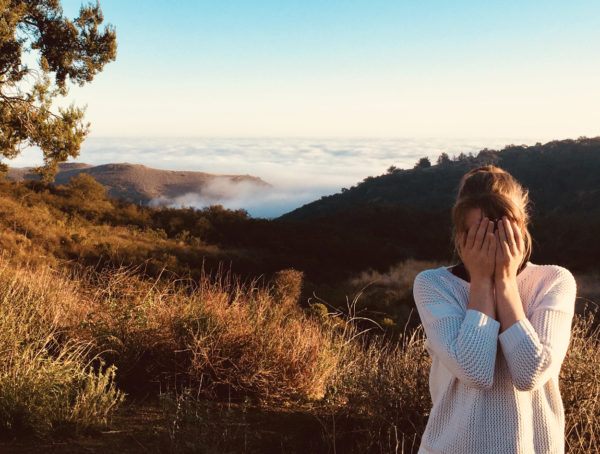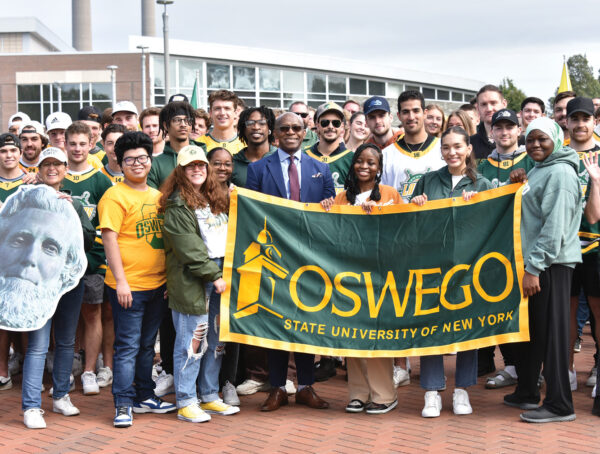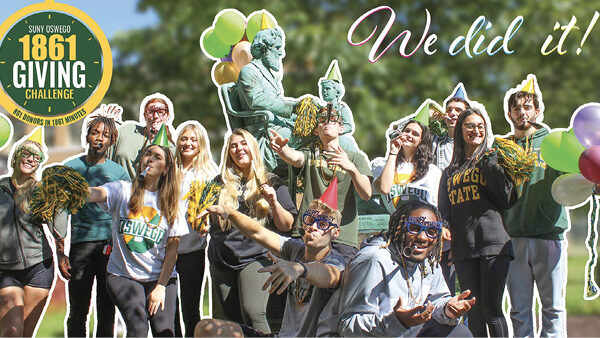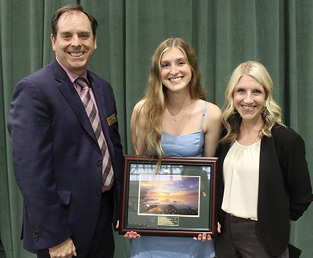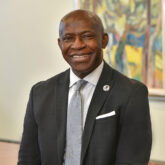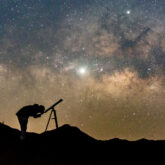
 Less than a year after he did live on-campus broadcasts of “Wake Up With Al” and NBC’s “Today” show, Al Roker ’76 returned to campus Sept. 25, making time for visits with students before an evening book reading and discussion of his latest writing project, The Storm of the Century.
Less than a year after he did live on-campus broadcasts of “Wake Up With Al” and NBC’s “Today” show, Al Roker ’76 returned to campus Sept. 25, making time for visits with students before an evening book reading and discussion of his latest writing project, The Storm of the Century.
He made good use of the blue Chuck Taylors he was wearing for the trip.
After broadcasting his morning shows in New York City, Roker arrived in Oswego midday, just in time to pick up his signature Al Roker sub from the Oswego Sub Shop for lunch. Then it was off to meet with student reporters from WTOP-10 TV, TheOswegonian and WNYO radio, and record some promos with Molly Matott ’15, weekend meteorologist for CNY Central/NBC Channel 3 in Syracuse, and President Deborah F. Stanley. He did an interview with WRVO, the on-campus National Public Radio station.
He made time to stop by the annual ALANA (African, Latino, Asian and Native American) Student Leadership Dinner, which wrapped up the week of events around the theme “Empowerment for the Future.”
Then he headed over to the Marano Campus Center to greet the more than 200 people in the auditorium and nearly 600 people watching WTOP-10 TV’s live webcast of the book discussion.
“This is a proud moment for the college,” said President Deborah F. Stanley, who served as emcee of the event. “Two Oswego alumni meteorologists on stage together talking about this compelling new book—one who is perhaps the most well-known meteorologist in the country and the other who is just starting out in her career. We take pride in our ability to educate individuals who pursue lives that make the world a more informed—a better—place.”
Roker, America’s favorite weatherman and 13-time Emmy Award-winning TV personality, said he initially set out to write his first non-fiction book about the 10th anniversary of Hurricane Katrina. But during his research for the book, he kept coming back to the Great Hurricane of 1900, a massive, category five hurricane that hit Galveston, Texas.
“It is still the deadliest natural disaster in our country’s history,” he said. “More than 10,000 people died in the city of Galveston on Sept. 8, 1900, and on Sept. 7, there were 38,000 people who lived in Galveston.”
Roker explained how political differences between the U.S. and Cuba at the time prompted the U.S. War Department to cut off the telegraph lines, which, in essence, isolated Cuba and its meteorologists, who had issued a forecast a week before calling for a hurricane to make landfall about 100 miles from Galveston. The U.S. meteorologists had forecast showers and breezy conditions for Sept. 8.
“The tide started coming in and it kept coming in, and people thought it was a novelty,” Roker said. “They all went down to see the water in the streets. They were playing in it and enjoying it, but the water kept coming and kept coming. Waves started to increase. When this storm made landfall, it had winds of over 200 miles per hour and waves of anywhere between 15 to 30 feet.”
He described how several major U.S. figures, including news titans William Randolph Hurst and Joseph Pulitzer, Red Cross founder Clara Barton and female crusading journalist Winifred Black, played a role in the recovery.
“One of the things that fascinated me most about this event was this confluence of larger than life characters who are part of American history,” Roker said.
Roker said he hopes the book highlights not only the stories and heroic deeds of the people from 1900, but also some lessons still to be learned about major weather events.
“We like to think that we control our destiny and our universe,” he said. “We tend to find out rather painfully that we don’t … I’m very proud of this book and I think it speaks to the human spirit.
“It’s really an American story, and I’m honored to bring it to you.”
The event was co-sponsored by SUNY Oswego and the river’s end bookstore in Oswego.
Excerpts from the Q&A with Molly Matott ’15 and Al Roker ’76
 Matott: As a person who has covered natural disasters like Katrina and Superstorm Sandy, did that make the book easier to write for you or was it more difficult having witnessed it firsthand?
Matott: As a person who has covered natural disasters like Katrina and Superstorm Sandy, did that make the book easier to write for you or was it more difficult having witnessed it firsthand?
Roker: You try to be somewhat dispassionate about it. You don’t want to gild the lily. You want to make sure to look at what was written about it back then and also how they talked about in their own words in some of these oral histories. What these folks experienced spoke for itself and you didn’t have to embellish it.
Matott: Imagine that the storm happened today with our transport of communication and social media and television and radio. How do you see that playing out in today’s time if the storm was to hit tomorrow?
Roker: The good news is that we have more information at our availability than ever before. We don’t just have access to our own computer models and forecasts; we have access to that information from around the world. We have an opportunity to look at all those different models and we have the ability to tell people about it. But human nature being what it is, the longer out you talk about a disaster, the less likely people are going to be to heed the warnings.
Matott: With today’s forecasting models, how do we balance not underselling big events and not over-sensationalizing small events?
Roker: Well, I think that’s the key. We can’t possibly call everything the storm of the century, or “Will there be a devastating storm coming up? I’ll have the details.” We can’t do that and expect people to listen to us when it’s time to really listen to us. So I think we try on the Weather Channel and the “Today” show to be somewhat circumspect about hyping, if you will, a storm.
Matott: You mentioned before that even before the storm hit, Galveston was a pretty progressive city in terms of both race and gender, and they might have had a setback when the storm hit and racially divide once again. But in the future of Galveston, it was actually a pioneer in racial and gender equality.
Roker: Because they had to. They realized that people had to come together to survive. It was pretty amazing. The whole episode was one that a lot of people could learn from.
Matott: I also wanted to mention that your book was the first book to use the oral histories collected in Izola Collins’ Island of Color (2004). By using those oral histories, did you feel a connection to the people?
Roker: Yeah, because it’s somebody’s voice. A lot of the accounts and research that we had was third-person reporting. This was people in their own voices telling their story. It’s pretty compelling. When you have somebody’s voice speaking to you across time and a lot of very distinct voices, very elegant voices, you have to stop to take notice.
Matott: As a TV man, what do you see the future of television being in five to 10 years?
Roker: I have no idea. This whole livestreaming thing really caught on. It’s like back to the future. When television started, everything was live, and now everybody can be a live broadcaster—which is great—but Jeff Goldblum’s character in Jurassic Park put it very succinctly: “Just because you can, doesn’t mean you should.”
–Margaret Spillett
You might also like
More from Campus Currents
University Celebrates Third Annual Founder’s Weekend
University Celebrates Third Annual Founder’s Weekend Several hundred members of the Laker community gathered together on campus to learn about the …
SAVAC Captain, Biology Major Named 2023 Outstanding Senior Award Winner
SAVAC Captain, Biology Major Named 2023 Outstanding Senior Award Winner Shannon Harris ’23, a biology major from Webster, N.Y., was selected …

